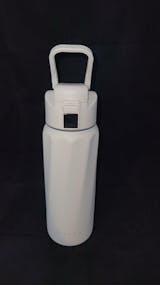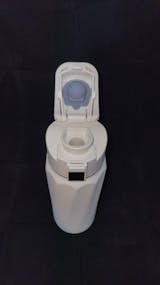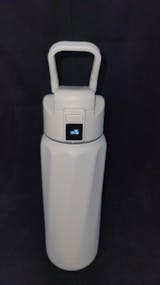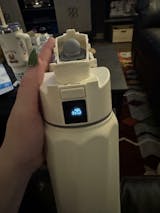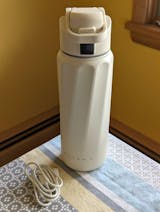
Sip Right, Sleep Tight: Ending the Nighttime Bathroom Walks
Quality sleep is essential for maintaining good health, mental clarity, and overall well-being. Yet, many people find their sleep disrupted by frequent nighttime trips to the bathroom. This common issue can often be traced back to hydration habits, specifically, overhydration before bedtime. This blog delves into the connection between nighttime hydration and disrupted sleep, explaining the concept of overhydration and offering practical solutions to manage fluid intake more effectively. We’ll also explore how technology, such as smart water bottles, can assist in optimizing hydration habits to ensure better sleep quality.
Understanding the basics of overhydration

Overhydration occurs when the body takes in more water than it needs, leading to an imbalance of electrolytes and other health issues. Symptoms of overhydration include nausea, headaches, swelling, and, in severe cases, hyponatremia, a condition characterized by low sodium levels in the blood. While these symptoms are concerning, overhydration’s impact on sleep is often overlooked.
When you consume excessive amounts of water, especially in the evening, your body has to work overtime to eliminate the excess fluid. This results in frequent urination, which disrupts the natural sleep cycle. The need to wake up and use the bathroom multiple times during the night prevents you from reaching the deeper, restorative stages of sleep. Over time, this fragmented sleep can lead to chronic sleep deprivation, negatively affecting your physical and mental health.
The link between nighttime hydration habits and disrupted sleep

Hydration is crucial for our bodies to function correctly, but the timing and amount of fluid intake play a significant role in sleep quality. Consuming large amounts of water or other beverages in the evening can lead to increased urination at night, known as nocturia. This condition disrupts sleep by causing individuals to wake up multiple times at night to use the bathroom.
Studies indicate that nocturia is a common problem affecting people of all ages, but it becomes more prevalent as we age. According to the National Sleep Foundation, nocturia affects up to two-thirds of adults aged 55 and older. Frequent bathroom trips at night interrupt the sleep cycle and lead to poor sleep quality, resulting in daytime fatigue, irritability, and decreased cognitive function. Understanding the connection between nighttime hydration habits and disrupted sleep is the first step in addressing this issue.
How to manage your fluid intake to improve sleep
To improve sleep quality, it’s essential to manage your fluid intake throughout the day, paying particular attention to your evening consumption. Here are some practical tips to help you achieve this balance:
- Hydrate early: Start your day by drinking water as soon as you wake up and continue to hydrate throughout the morning and early afternoon. This ensures your body stays hydrated without consuming water later in the day.
- Monitor caffeine and alcohol: Both caffeine and alcohol are diuretics, which increase urine production. Limit your intake of these beverages, especially in the evening, to reduce the likelihood of nighttime bathroom trips.
- Eat water-rich foods: Incorporate water-rich foods, such as fruits and vegetables, into your diet earlier in the day. These foods contribute to your overall hydration without requiring you to drink excessive amounts of water.
- Set a cut-off time: Establish a time for drinking fluids, ideally two to three hours before bedtime. This gives your body enough time to process and eliminate excess fluids before you go to sleep.
- Consistent routine: Maintain a consistent daily hydration routine. Your body will adjust to this pattern, helping you manage your fluid intake more effectively and reduce the risk of nighttime disruptions.
Leveraging technology: WaterH smart water bottles
Incorporating technology into your hydration routine can make managing fluid intake easier and more effective. Water reminder water bottle and app tracking are excellent tools for helping you stay hydrated throughout the day without overhydrating at night.
Smart water bottles work by providing visual and app-based reminders to drink water at regular intervals. This helps ensure you distribute your fluid intake evenly throughout the day, reducing the need to drink large amounts in the evening. Here are some of the benefits of using a smart glass water bottle:
- Visual reminders: The bottle's LED lights can flash to remind you to take a sip, preventing you from forgetting to hydrate during busy days.
- App tracking: Many smart water bottles come with companion apps that track your water intake, set personalized hydration goals, and provide insights into your drinking habits.
- Customized plans: Based on your activity level, weight, and other personal factors, the app can create a customized hydration plan tailored to your needs.
- Long-term benefits: By helping you establish and maintain a consistent hydration routine, smart water bottles can improve your overall health and well-being, including better sleep quality.
Success stories and testimonials from users highlight the effectiveness of smart water bottles in improving hydration habits and sleep quality. For example, one user reported that after using a smart water bottle for a few weeks, they no longer woke up multiple times at night to use the bathroom, resulting in more restful sleep and increased daytime energy.
Conclusion
Understanding the link between hydration habits and sleep quality is crucial for anyone looking to improve their rest and overall well-being. By managing fluid intake throughout the day and leveraging technology like smart water bottles, you can reduce nighttime bathroom trips and enjoy better sleep. Adopting these healthier hydration practices enhances sleep quality and contributes to long-term health benefits. Follow WaterH to find more tips for staying well-hydrated.













